Can Dogs Eat Tuna? Tuna is like the ultimate treat for cats, but even dogs might find it tempting because of its strong smell. If your dog is giving you those adorable eyes, wanting a taste of tuna, here’s what you should consider before giving in.
Derived from the ocean, tuna contains natural salt. Dogs can enjoy occasional small portions, but individual tolerance varies. Begin with a small amount to assess your dog’s reaction, considering unique sensitivities.
People have different opinions on whether dogs should eat tuna or not. Some say it’s fine and even use it in dog food. But when it comes to giving tuna as an extra treat, experts don’t all agree. Some say it’s okay, while others suggest not adding more tuna to your dog’s meals.
No need to worry too much if your dog grabs a little piece of tuna from your plate without you noticing. Tuna is generally safe for dogs, and a small amount won’t give them mercury poisoning.
Tuna is packed with important nutrients that are good for your body, like:
✔ Vitamins B3, B6, and B12: help your body work well and give you energy
✔ Potassium and magnesium: keep your muscles and tissues healthy
✔ Phosphorus: makes your bones strong
✔ Selenium: boosts your immune system and takes care of your joints
Ensure your canine companion doesn’t consume your feline’s wet tuna cat food to prevent potential mercury exposure. Opt for cat food featuring varied fish to mitigate mercury risk for both pets. Vigilantly monitor dogs for signs of mercury poisoning.
Overview: Can Dogs Eat Tuna?
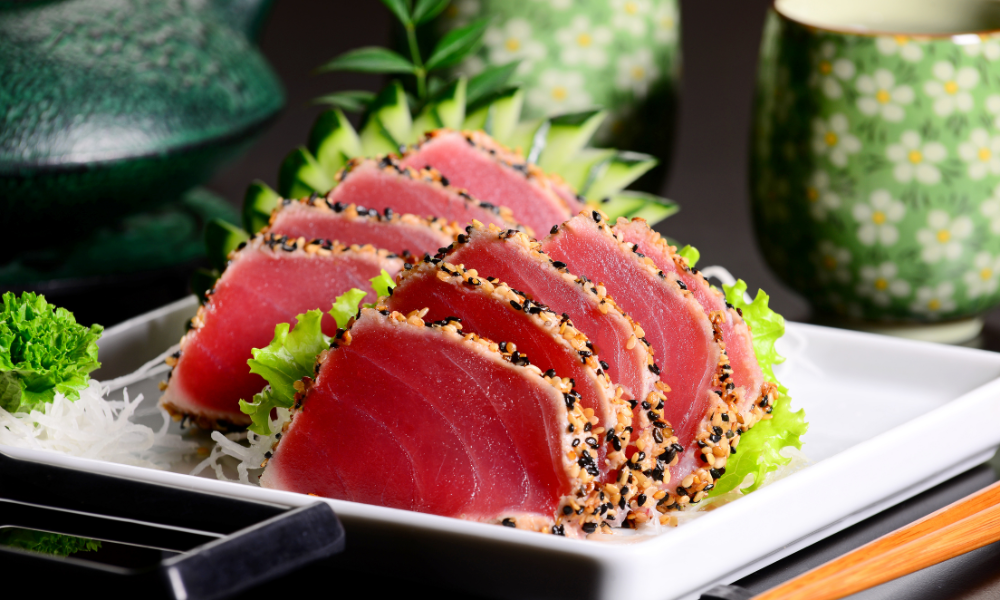
It’s okay to give your dog a bit of tuna as an occasional treat, but don’t make it a regular food. Tuna has good stuff like protein and omega-3 that helps keep your dog healthy. But, be careful because tuna also has something called mercury, which can be bad for your dog’s health if they eat too much of it over time.
Some dog foods have tuna, but it’s better not to give it to your dog every day. If you want your dog to have fish regularly, pick dog food with fresh fish that doesn’t have a lot of mercury.
Also, pay attention to the kind of tuna you’re giving. Canned tuna can be in brine, springwater, or oil, and each one has different things to consider for your dog. And there are different types of tuna in the ocean. So, if you’re wondering what kind of tuna is good for your dog, it depends on the species.
Now let’s address some of your questions in detail.
Can Dogs Eat Canned Tuna?
Feeding your dog a bit of canned tuna can be a good and healthy treat. Pick tuna in water, not oil, and go for albacore or skipjack kinds instead of big ones (like bigeye or bluefin) to have less mercury in each serving.
However, canned tuna is often high in salt, which isn’t good for our furry friends. You can find cans with no added salt, and these are a better choice if you want to share tuna with your pup.
Some canned tuna has added herbs and spices, which might taste good to us but can make your dog sick. So, avoid giving your dog tuna with extra seasonings. Apart from the type of tuna and added spices, canned tuna comes in different liquids—brine, sunflower oil, or freshwater. Which one is safe for dogs?
Can Dogs Eat Tuna Steak?
Tuna steak is a bit tricky for dogs. Some people really like bluefin tuna, especially when it’s raw in sushi. But for your furry friend, it’s not safe to give them raw tuna because it might have parasites and could upset their stomach. Also, avoid giving them bluefin tuna because it has too much mercury.
But, if you have tuna steak from types with less mercury, like Albacore or Skipjack, it’s okay to share a bit with your dog. These types are usually found in canned tuna steak. Just make sure to cook it before giving it to your pup, and don’t add any extra stuff to it.
Can Dogs have Tuna in Brine?
A small amount of tuna in brine is okay, but it’s best not to give it to your dog. It has a lot of salt, which can be harmful and cause sodium poisoning. Tuna in sunflower oil is a bit safer, but the best choice is tuna in spring water. It has less salt and fat compared to other types of canned tuna.
Can Dogs have Tuna in Sunflower Oil?
If you drain the fish well, it’s safe for your dog to have a little tuna in oil. Sunflower oil is lower in bad fat and can even be good for your dog’s fur in small amounts. But too much oil can lead to weight gain and inflammation. Sunflower oil has omega-6, which is good for your dog, but it needs to be balanced with omega-3 to prevent inflammation and immune issues.
While a bit of tuna in sunflower oil is safe, the best choice is tuna in spring water for your dog.
Nutritional Benefits of Tuna for Dogs
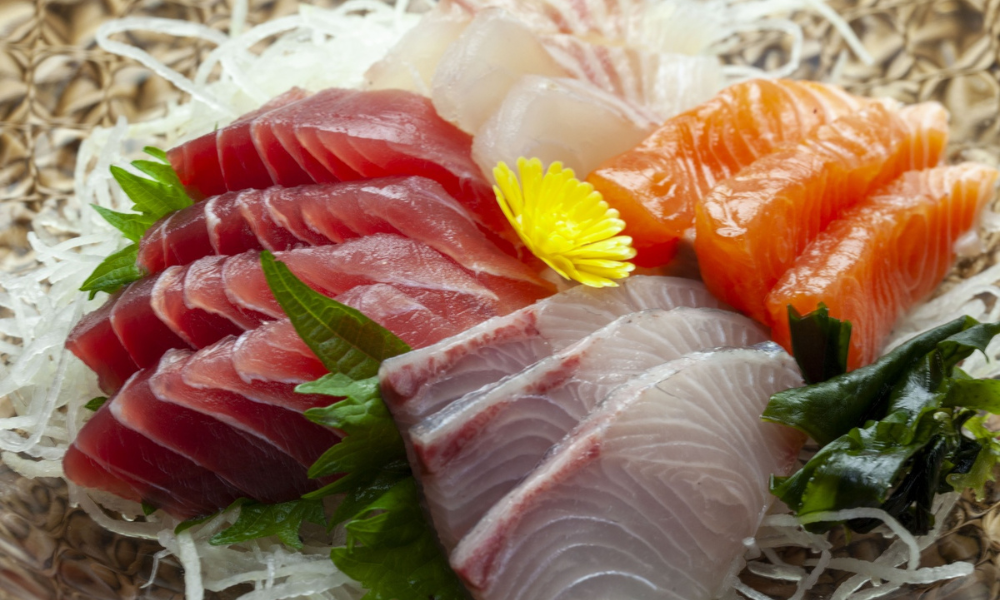
Tuna is full of good stuff like protein, minerals, and vitamins that are important for your dog’s health. It also has Omega 3 fatty acids that are great for their skin, fur, and heart. Some dog foods use tuna to give dogs the nutrients they need. If you want to give your dog a bit of tuna as a treat, you don’t have to worry about it being super healthy. As long as your dog eats a complete and balanced dog food, they’ll get all the nutrients they need from that.
Tuna has lots of protein and omega-3 fatty acids, which are important for keeping your dog’s skin, fur, and joints healthy. It also has vitamins like B12, selenium, and niacin, which are good for dogs. Giving a little bit of tuna as an occasional treat is okay for dogs.
It’s not a good idea to make tuna the main food for your dog or give it to them regularly. Tuna has a metal called mercury, which can be harmful to both humans and animals if they get too much of it. According to the U.S. Food and Drug Administration (FDA), tuna has more mercury than most other seafood. There are safer options like salmon if you want to add something nutritious to your dog’s diet.
Can Puppies Eat Tuna?
Is it Okay for Puppies to Eat Tuna? Puppies should wait a bit before trying tuna. They need to grow, and there’s special food just for them to grow up healthy. It’s a bit tricky to give them the right amount because they’re small. So, for now, it’s best to keep tuna in the cupboard.
Don’t give tuna to puppies, even a small amount once in a while. Mercury poisoning is a serious risk, especially for small breeds and growing puppies.
Dogs can have canned tuna, but not too much. Pick the one in water, not oil or salted water. Check the label to be sure there’s no extra salt added. Don’t give your dog raw tuna. Raw fish might have bad stuff that can make your dog sick. There’s also an enzyme in raw fish that stops vitamin B1 from working. Cooking the fish solves this, so make sure tuna is cooked before giving it to your dog.
Health Risks of Tuna for Dogs
It’s not a good idea to give your dog tuna because it can make them sick. Tuna has some things that can hurt your dog, like too much mercury. Mercury is a kind of stuff in the fish that can make your dog very sick. It can make them have problems like diarrhea, shaking, or throwing up blood.
Tuna from a can is not good for dogs because it has bad things added to it. The can may have things like salt, pepper, tomatoes, onions, or other spices. These things can be really bad for your dog and make them sick or have trouble digesting their food.
Tuna also has a lot of salt in it, and that’s not good for your dog. Too much salt can make your dog’s blood pressure go up and cause problems. So, it’s better to not let your dog eat foods with a lot of salt.
Sometimes, fresh tuna can have germs that are not good for your dog. These germs can make your dog sick for a long time and give them health problems.
Also, tuna has too much fat. Too much fat is not good for your dog because it can make them have trouble digesting their food or make them gain too much weight. It’s better to give your dog homemade food or food made for dogs from the store.
Tuna could Lead to Mercury Poisoning
The impact of mercury on pets mirrors its effects on humans. It may induce digestive issues and harm vital organs such as the kidneys and the brain. In the unfortunate event of breaking an item containing mercury at home, if your pet is in proximity, there’s a risk of mercury residue adhering to their paws or fur.
Tuna fish has more mercury than many other fish, and if animals eat too much, there’s a risk of mercury poisoning. Mercury is a pollution that goes into the oceans, where fish like tuna absorb it. Tuna can live a long time, like up to 40 years, so they gather a lot of mercury in their bodies over time.
It’s not common, but dogs can get sick or even die if they eat too much tuna, especially if the tuna has a lot of mercury in it. Mercury is a harmful substance that can seriously hurt dogs and even lead to their kidneys failing.
But not all tuna is the same – some kinds have more mercury than others. How much danger there is depends on the type and how much tuna a dog eats. Usually, it’s okay to give your dog a little bit of cooked tuna as a special treat, but don’t make it a regular part of their meals. Be extra careful with small or young dogs, or those with health issues – they shouldn’t have any tuna at all.
If you see anything strange in your dog that makes you think they’re reacting badly, talk to your vet.
| Signs of Mercury Poisoning in Dogs | What to Look For |
|---|---|
| Hair Loss | Dogs losing fur |
| Dog Blindness | Dogs unable to see |
| Tremors | Shaking or trembling in dogs |
| Dog Vomiting Blood | Dogs throwing up blood |
| Lack of Coordination | Difficulty in moving or balancing |
| Watery Diarrhea in Dogs | Dogs having loose, watery stools |
| Nervousness or Anxiety in Dogs | Dogs appearing stressed or uneasy |
| Dog Kidney Damage | Issues with dog’s kidneys |
Feeding tuna to your dog in small amounts and not often is not likely to cause mercury poisoning. Still, it’s smart to check with your vet before adding tuna to your dog’s meals. They can suggest the right amount based on your dog’s weight and health.
Pathogenesis in Animals
Physical and chemical properties influence the impact of mercury forms on animals. Organic forms, particularly methylmercury, exhibit extensive bioaccumulation in tissues like the brain and kidney. Methylmercury disrupts metabolic activity, leading to degeneration, necrosis, and various pathological findings.
Fish bones can be a danger. Tuna, like other fish, can have small bones that might make your dog choke or harm their digestive tract. Before giving tuna to your dog, check for bones and take them out.
Tuna has a lot of salt. Some experts say no to dogs eating tuna because of this. But if you give only a little bit, your dog can enjoy tuna from time to time without problems.
If your dog eats too much tuna, it can be really bad. It might hurt their kidneys and make them blind. So, try not to give tuna to your dog, or at least give them just a little bit sometimes. It’s safer that way.
Treat Mercury Poisoning in Dogs
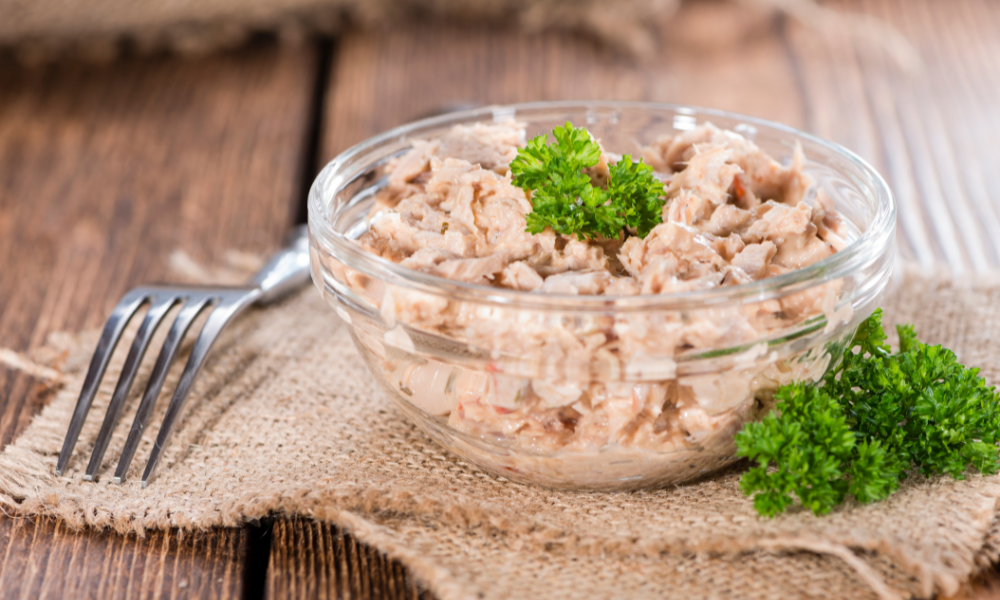
If you think your dog ate a lot of tuna and might have mercury poisoning, call your vet right away. Getting help early is important to lower the chance of lasting problems and improve the chances of your dog getting better.
The treatment for mercury poisoning in dogs depends on how bad it is and what symptoms your dog shows. Sometimes, the vet may give fluids through a vein and medicine to stop vomiting and diarrhea.
If the poisoning is really bad, your dog might have to stay in the hospital. There, they can get medicines that stick to the mercury and take it out of the body, like charcoal. In some cases, dogs may even need dialysis to clean the toxin from their kidneys.
Prevent Dog from Eating Tuna
It can be a challenge to keep dogs away from food they’re not supposed to eat. For example, you may also have a cat who eats wet food containing tuna. If your dog tends to get into the cat’s food, try feeding them in separate rooms blocked by a door or gate. Also consider feeding your cat a wet food made with another type of fish.
Although less common when compared with dogs, cats can get mercury poisoning from eating tuna over the long term as well. If your dog loves seafood, there are many options besides tuna to satisfy their cravings. Consider other types of fish that are appropriate for dogs, such as salmon or whitefish. Many dog foods are made with fish ingredients that are okay for pups to enjoy.
Raw Tuna for Dogs
Raw fish, including tuna, may have harmful parasites or bacteria that can make your dog sick. Additionally, raw fish contains an enzyme called thiaminase, which can prevent the absorption of vitamin B1. Cooking the fish solves this issue, so it’s important to make sure tuna is fully cooked before including it in your dog’s meal. This helps keep your furry friend safe and healthy.
Tuna’s high mercury content stems from the accumulation of heavy metals like mercury and lead in the ocean. Fish with longer lifespans accumulate more of these metals due to continuous exposure. Tuna, being a large and long-lived fish, contains higher mercury levels, making moderation crucial to avoid mercury poisoning.
Accidental Consumption: What to Do?
If your dog inadvertently consumes a small portion of cooked or canned tuna, there’s no cause for major alarm. Mercury toxicity is unlikely in such cases. Yet, contact your vet if your dog consumes raw tuna or if they exhibit an allergy to it.
It’s okay for your dog to have a bit of tuna now and then as a treat. However, giving them a lot or too often can be risky. If your furry friend manages to snatch a whole can of tuna, they might end up with a tummy ache, especially if it’s packed in oil instead of water. Dogs could even get pancreatitis from tuna in oil.
Watch your pet closely if they eat a bunch of tuna, especially the kind with more mercury, like albacore tuna. If you see an
Safer Alternatives: Fish for Dogs
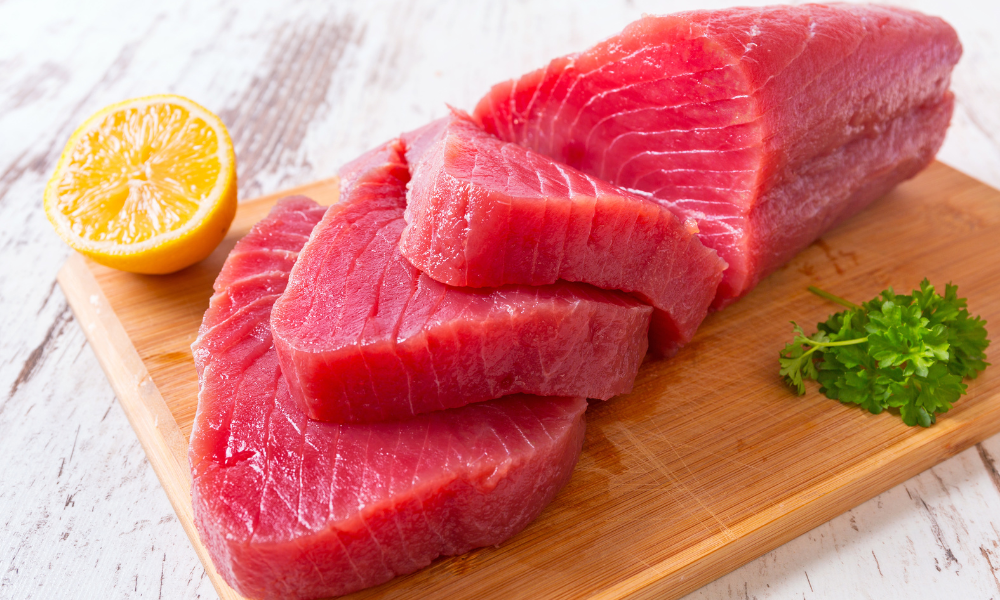
Which fish are safe for dogs to eat? Generally, it’s safer for dogs to eat smaller, wild-caught fish because they usually have lower levels of harmful mercury and fewer parasites. Here is a list:
| Fish Type |
|---|
| Salmon |
| Flounder |
| Whitefish |
| Herring |
| Cod |
| Catfish |
| Whiting |
Which fish should dogs avoid? Some fish species like shark, swordfish, king mackerel, and tilefish are not suitable for dogs. These fish are usually caught when they are bigger and older, which makes them more likely to have high levels of mercury and carry parasites in their skin, muscles, and internal organs.
Avoid giving your dog farm-raised fish too. These fish can contain harmful dyes, leftover antibiotics, and other toxins once they are harvested and processed.
| Fish to Avoid |
|---|
| Shark |
| Swordfish |
| King Mackerel |
| Tilefish |
How Much Tuna is Okay for My Dog to Eat?
Tuna has good stuff for your dog, but too much can be bad because of mercury. So, just give it sometimes, not every day. A small bit, like one tablespoon, is good. See how your dog reacts the first time you give it. If there’s a problem, you’ll probably notice within a day.
Big dogs can have one can of tuna in a week, but not every week. Smaller dogs can have about half a can in a week. Ask your vet about how much tuna is right for your pet. They’ll know based on your pet’s size, weight, and health needs.
Safe Tuna Recipes for Dogs
Are you curious about treating your furry friend to the delights of tuna? Well, look no further! Rover’s Chef Kiki Kane has skillfully crafted a range of tantalizing tuna-infused recipes that will make your dog’s taste buds dance with joy. From the delectable Tuna Pot Pie Treats to the scrumptious Crunchy Tuna and Egg Delights, your canine companion is in for a real treat.
01: Tuna Pot Pie Treats: A Wholesome Delight
| Ingredients | Instructions |
|---|---|
| 2 cans of tuna packed in water | 1. Preheat oven to 350 ºF (175 ºC). |
| 2 ½ cups of flour (all-purpose, wheat, or oat flour) | 2. Mix flour, tuna, and optional spices in a bowl. |
| ½ cup of low or no-sodium chicken broth | 3. Gradually pour in chicken broth, ensuring thorough mixing. |
| 2 eggs | 4. Add eggs and gently stir until a dough forms. |
| Optional: Turmeric, sage, and parsley | 5. Fold in frozen peas, carrots, or diced veggies. |
| ½ cup of frozen mixed peas and carrots or diced veggies | 6. Divide dough, roll out to 1/4 inch thickness. |
| 7. Cut out shapes with a cookie cutter, place on parchment. | |
| 8. Bake at 350 ºF for about 20 minutes until golden. | |
| 9. Allow treats to cool before serving to your pup. |
02: Crunchy Tuna and Egg Delights: A Sensational Sensation
| Ingredients | Instructions |
|---|---|
| 2 cans of tuna or 1 can of dog food | 1. Preheat oven to 350º. |
| 2 eggs | 2. Mix tuna/dog food and eggs until well combined. |
| 3. Use frosting tip to pipe batter onto parchment-lined sheet. | |
| Alternatively, spread batter, bake as a large cookie, and cut. | |
| 4. Bake at 350º for about 25 minutes until golden and firm. | |
| 5. For softer treats, they’re ready; for extra crunch, bake more. | |
| 6. No need for refrigeration – these delights are ready to serve. |
Balancing your furry friend’s food can have both positives and negatives. Raw fish is a no-go, but giving your dog occasional tuna isn’t a problem. Tuna appears in several well-rounded dog foods, full of tasty and healthy ingredients. These foods boost skin, coat, and heart health, making your pup happy and fit.
Certain types of fish, like whitefish, herring, walleye, flounder, arctic char, and salmon, have shorter lifespans. These fish are definitely safer to feed. On the other hand, there are fish with longer lifespans, such as tuna. When prepared correctly, these long-life fish can provide numerous health benefits for getting your pet ready to enjoy a life full of fun.
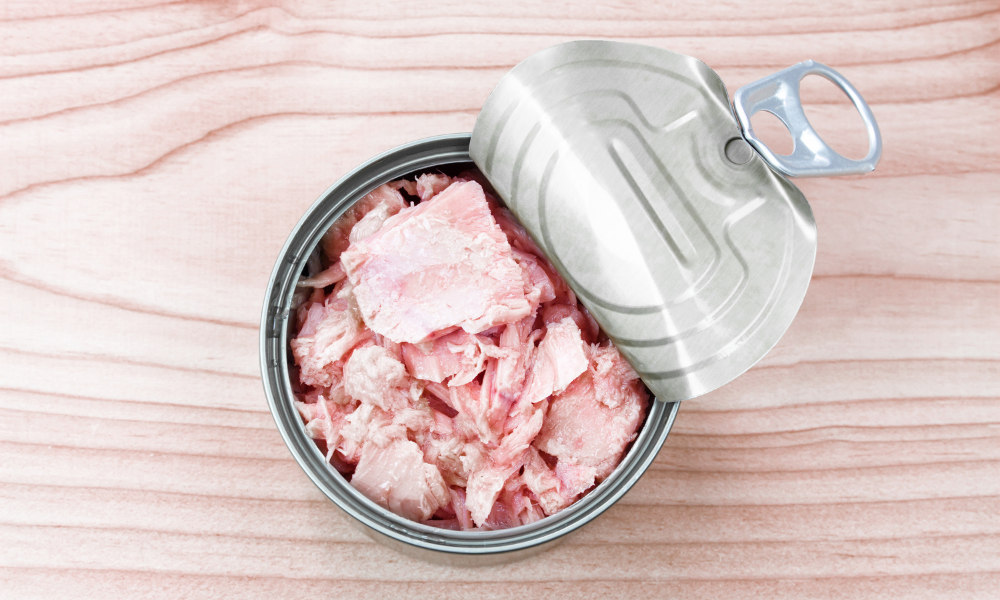
Bonus Read | Can Dogs Eat Tuna?
While dogs can eat tuna, there are important factors to consider before sharing this fishy treat with your furry friend. Tuna is a saltwater fish, and it’s crucial to be cautious when introducing it to your dog’s diet. Feeding small quantities occasionally is generally safe, as each dog may react differently.
Tuna packs a punch of protein, minerals, and vitamins beneficial for a dog’s health. However, experts have conflicting opinions on whether to use it as a treat. Tuna is a common ingredient in balanced dog foods, but extra servings may not be universally recommended.
When pondering the question of how much tuna to give your dog, consulting your vet is essential. Mercury poisoning is a concern, as tuna contains higher mercury levels compared to other fish. Symptoms like hair loss, tremors, and kidney damage may occur, but the risk is lower with occasional, small portions. Always be vigilant for unusual signs and consult your vet if needed.
Fish bones in tuna can pose a choking hazard and may damage the digestive tract. To mitigate this risk, it’s advisable to remove bones before feeding. Additionally, the high salt concentration in tuna raises concerns, emphasizing the importance of moderation.
Puppies should steer clear of tuna due to their specialized dietary needs, and caution should be exercised when feeding canned tuna to dogs. Opt for versions packed in fresh water and avoid those with added salt. Raw tuna is a no-go, as it may contain harmful bacteria or parasites.
In case your dog accidentally consumes tuna, especially raw or if allergic, contacting your vet is wise. Overall, understanding the nuances of feeding tuna to dogs ensures a safe and enjoyable experience for your canine companion.
FAQs:
You Might Also Like:




